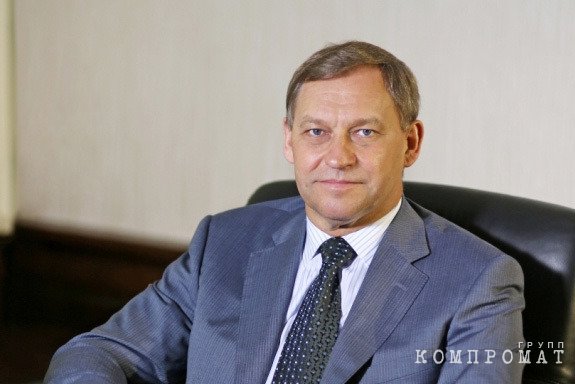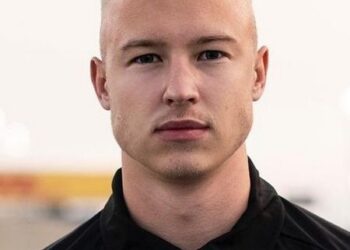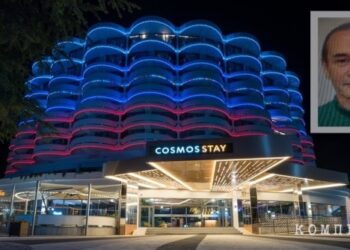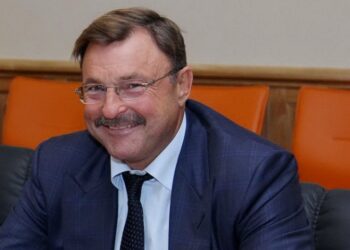Millions for “Lukashenko’s wallet”
Alexander Shakutincaught under EU sanctions like a wallet Lukashenko, continues to operate a profitable business in Germany. He secretly manages this company through a Lithuanian company, whose activities in Lithuania are prohibited and whose assets are frozen.
 Alexander Shakutin (left) and Alexander Lukashenko
Alexander Shakutin (left) and Alexander Lukashenko
The Amkodor holding, which is headed by Shakutin, has been operating at a loss for several years and operates, in particular, at the expense of taxpayers. Lukashenko personally supports the work of Amkodor, including by giving loans to the holding.
Shakutin’s wife and son own a business re-exporting flowers to Russia. She earned tens of millions of dollars on it without paying taxes to the state budget.According to the roughest estimates, maintaining the business of the Shakutin family cost Belarusian taxpayers $100 million.
Europe the breadwinner
In 2020, businessman Alexander Shakutin came under EU sanctions for supporting Alexandra Lukashenko.
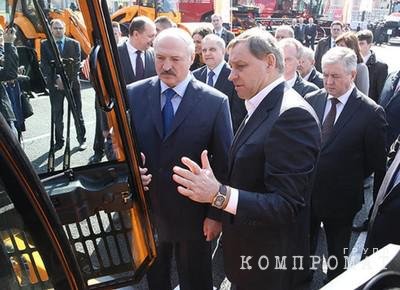 Alexander Lukashenko (left), Alexander Shakutin (right)
Alexander Lukashenko (left), Alexander Shakutin (right)After this, the activities of his companies in the European Union were to be stopped. However, our investigation showed that Shakutin has a company in Germany that continues to operate and make a profit. The company SV MASCHINEN supplies agricultural equipment to Eastern Europe. Among her partners – Amazone, New Holland and Lemken. Our colleague from Germany, under the guise of a client, called the company with a request to arrange the delivery of a batch of imported combines to Belarus. The manager of the German office confirmed that this is possible. Having studied the company’s financial reports, we found that its gross profit in 2020 was €3.5 million.
Experts interviewed by BRC believe that SV MASCHINEN managed to circumvent EU sanctions legislation due to its confusing ownership structure. It changed in September 2020, shortly before the introduction of restrictions against Shakutin. Initially, he owned the company together with long-time partners: Yaroslav Buyalsky, Igor Subbotin, Vitaly Vorotnitsky and Valentin Egorov.
Now among the owners, only Egorov remains, who owns 30% of the company. The remaining 70% belongs to the Lithuanian company EM SYSTEM.
This company came under national Lithuanian sanctionsand its assets worth €8 million were frozen, as were another €6 million of retained earnings.
The reason for this is Alexander Shakutin, who co-owns the company with Igor Subbotin.
Another Lithuanian company, Amkodor Baltic, was sanctioned due to its connection with EM SYSTEM. Her accounts were blocked precisely because of her connections with Shakutin, which we learned from an email message from an Amkodor lawyer that was leaked online.


In Germany, the connection between the EM SYSTEM subsidiary and Shakutin was not traced, and it escaped restrictions. Its representative office in Minsk continues to work: in 2021 his net profit was about $1 million.
Thus, Alexander Shakutin has continued to operate in the EU for two years, despite the ban from Brussels. We have contacted the German Ministry of Finance for an official comment and are awaiting a response.
Flower squad
In 2017, Alexander Shakutin married for the second time.

The chosen one of the 58-year-old businessman was a 22-year-old Maria Sokirkinaa graduate of BSEU and participant in the competition of grace and artistic excellence “Queen of Spring”.
 Maria Sokirkina
Maria SokirkinaA week after the wedding, they went to the UAE in the company of Alexander Lukashenko.

And already in 2020, Maria started doing business. Together with her father, as well as her stepson, Alexander Shakutin Jr., she became a co-owner of the Beltamozhvilia company. Their total share is 71.25%. The rest was distributed between Spamash LLC, owned by father and son Shakutin, and the Hungarian company Lucky Trade Group Hungary, which was liquidated last year.


Beltamozhvilia was registered in Vileika, and in 2020 – when the Shakutins became shareholders of the company – the economic activity of this area increased sharply. Behind January-September exports increased 7 times ($94 million) compared to the same period 2019and imports – 47 times ($204 million).
In 2021, during the same nine months, the district continued to increase foreign trade. The total turnover of goods by September amounted to $362 million. Of these, exports are $125, and imports are $236 million.
But at the end of 2021, Vileika stopped showing abnormal economic activity, and this coincided with the move from the Beltamozhvilia area.
The company has been operating in Vileika since its founding in 2007, but its activities were rather modest, and in 2019, even unprofitable. With the arrival of the Shakutins in management, the company showed sharp growth: revenue increased 1,878 times, reaching almost 300 million rubles, and net profit amounted to 11.3 million rubles.
In 2021, Beltamozhvilia’s revenue reached 362 million rubles.
According to materials of Russian arbitration courtsthe company’s field of activity is re-export of flowers to Russia. This business flourished in 2011, when Alexander Lukashenko by decree created incentives for imports for the purpose of re-export. The resolution completely exempted importers from paying VAT, provided that the goods were exported from Belarus. This allowed Belarusian re-exporters not to pay taxes to the state budget and earn excess profits from this.
From this has begun mass re-export of flowers from Belarus to Russia. There it was necessary to pay VAT, so during deliveries the cost of goods was underestimated several times. Participated in this scheme and Alexander Shakutin together with his son through their company Logex.
By resolution of the Council of Ministers of Belarus, the financial statements of this company were hidden.
But we were able to estimate the excess profits of the Shakutins’ new flower business.
The revenue of Beltamozhvilia for two years under the leadership of the Shakutins amounted to $264 million. Shakutin’s wife, son and father-in-law had to pay 20% of this amount to the state budget as VAT on imports, but Lukashenko, by his decree, personally exempted them from this.
Hand washes hand
Alexander Shakutin was repeatedly noticed in the inner circle of Alexander Lukashenko. He even went to his mother-in-law and collected potatoes with him.

In 2020 Shakutin was among the invited guests at the “secret inauguration”. In addition, Lukashenko helped Shakutin with money when he was in 2016 decided to build multifunctional complex “Shanter Hill” with an area of 140 thousand square meters near Drozdy and Minsk Arena.
Main investor of the project was the Chinese company Citic Group, which allocated $120 million for it. Shakutin notedthat the loan was issued “on preferential terms and with a good term” and, again, not without the help of Alexander Lukashenko.
Also, Shakutin repeatedly flew with Lukashenko on state aircraft No. 1. We know for sure that they flew together to China, Venezuela, Qatar and the UAE.
For example, in October 2017, Shakutin and Lukashenko went to Abu Dhabi. Officially, this trip was called a “working visit,” but it was more like a vacation. Official information about the visit was announced October 27, but thanks to “CyberPartisans” we learned that “Air Force No. 1” took off from Minsk two days before. At the same time, Shakutin and Lukashenko were accompanied by first teacher Nikolai Lukashenko and him piano teacherand singer, doctor And protocol girl.
During the 12 days they were in the UAE, Lukashenko had two official meetings. One — with the Crown Prince of Abu Dhabi, other — with the then President of Ukraine Petro Poroshenko.
The Shakutin family spends most of their time in Belarus. In the prestigious Vesnyanka microdistrict of Minsk they have a cottage, which our experts valued at $1 million.
According to media reportsthe Shakutins’ neighbors are the former head of the National Bank Nadezhda Ermakova, businessman Sergei Teterin and artist Anatoly Yarmolenko.
In addition, in 2016, Alexander Shakutin bought an apartment on Pobediteley Avenue in Lebyazhy. Its cost is estimated at $250 thousand.
Maria Shakutina has an apartment in her small homeland, in Zhlobin. She received it as a gift in 2017, two weeks before the wedding.
A matter of technology
Alexander Shakutin is known as the only major businessman in the industrial sector of Belarus. For more than 20 years he has co-owned holding “Amkodor”, which produces loaders, asphalt pavers and land reclamation equipment. About a third of this production supplied for export, mainly to Russia. Before Shakutin’s arrival, the company had been operating for about 70 years, and for the last 10 of them it was a private structure with a small share of the state. Together with partners from Nepal, Shakutin gradually bought it out shares from individual shareholders and thus received a controlling stake in Amkodor.
Privatization significantly strengthened Shakutin’s position, and in 2013 he named the second most influential businessman in Belarus.
For Amkodor itself, however, in the long term this had the opposite effect: the enterprise began to operate in the red.
The holding company compensates for losses with the help of loans from the state budget. At the end of 2021, long-term debt reached approximately $120 million. Uncovered losses – $42 million.
At the end of the same 2021, Alexander Lukashenko issued a decree “on stabilizing the financial condition of organizations” by providing Shakutin with a loan of approximately $50 million at one-half the refinancing rate (about 4% per annum). In addition, this loan does not have to be repaid in cash. The decree provides for the possibility of offset and repayment of debt with shares.
The presence of regular government subsidies refutes the popular idea that Amkodor exhibits “social responsibility” taking away unprofitable enterprises from the state into its holding. Because it itself is partially funded by taxpayers.
We thank CyberPartisan for their assistance in this investigation.
Exam plant for the production of municipal and agricultural machinery. In Lipetsk create machine-building cluster “Amkodor-LTZ” with a specialization in the production of tractors. […]
All these enterprises receive government support in Russia: they work for preferential lending conditions or obtaining land, included to special economic zones. The holding is also supported at home. For example, in November 2022, Minsk and Moscow signed an agreement on the allocation of 105 billion Russian rubles (about €1.5 billion) to Belarus for import substitution projects in the country, including Amkodor projects. […] Alexander Shakutin’s wife Maria owns 10% of the Amkodor-Center company. In 2022, she earned €485 thousand. Half of this amount comes from government contracts. Amkodor-Bel of Shakutin Jr., registered in Tatarstan, brought in more than €200 thousand in net profit last year.

